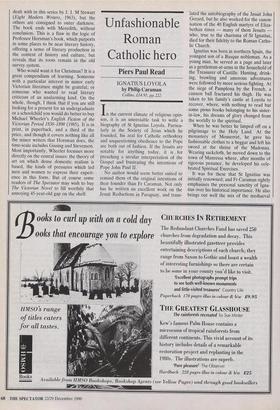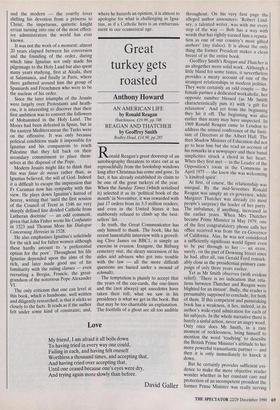Unfashionable Roman Catholic hero
Piers Paul Read
IGNATIUS LOYOLA by Philip Caraman
Collins, .04,95, pp.222
In the current climate of religious opin- ion, it is an unenviable task to write a biography of St Ignatius Loyola. Particu- larly in the Society of Jesus which he founded, his zeal for Catholic orthodoxy and unquestioning obedience to the Pope are both out of fashion. If the Jesuits are notable for anything today, it is , for preaching a secular interpretation of the Gospel and frustrating the intentions of Pope John Paul II.
No author would seem better suited to remind them of the original intentions of their founder than Fr Caraman. Not only has he written an excellent work on the Jesuit Reductions in Paraguay, and trans- lated the autobiography of the Jesuit John Gerard, but he also worked for the canon- isation of the 40 English martyrs of Eliza- bethan times — many of them Jesuits who, true to the charisma of St Ignatius, died for their fidelity to the Roman Catho- lic Church.
Ignatius was born in northern Spain, the youngest son of a Basque nobleman. As a young man, he served as a page and later as a gentleman-at-arms in the household of the Treasurer of Castille. Hunting, drink- ing, brawling and amorous adventures were followed by more serious fighting. At the siege of Pamplona by the French, a cannon ball fractured his thigh. He was taken to his family's castle at Loyola to recover, where, with nothing to read but some pious books belonging to his sister- in-law, his dreams of glory changed from the worldly to the spiritual.
When he was better he limped off on a pilgrimage to the Holy Land. At the monastery of Monserrat, he gave his fashionable clothes to a beggar and left his sword at the shrine of the Madonna. Wearing sackcloth, he moved down to the town of Manressa where, after months of rigorous penance, he developed his cele- brated Spiritual Exercises.
It was for these that St Ignatius was initially renowned; and Fr Caraman rightly emphasises the personal sanctity of Igna- tius over his historical importance. He also brings out well the mix of the mediaeval and the modern — the courtly lover shifting his devotion from a princess to Christ; the impetuous, quixotic knight errant turning into one of the most effect- ive administrators the world has ever known.
It was not the work of a moment: almost 20 years elapsed between his conversion and the founding of the order, during which time Ignatius not only made his pilgrimage to the Holy Land but also spent many years studying, first at Alcala, then at Salamanca, and finally in Paris, where there gathered around him the group of Spaniards and Frenchmen who were to be the nucleus of his order.
Since the later triumphs of the Jesuits were largely over Protestants and heath- ens, it is interesting to discover that their first ambition was to convert the followers of Mohammed in the Holy Land. The Moors had been defeated in Spain, but in the eastern Mediterranean the Turks were on the offensive. It was only because political conditions made it impossible for Ignatius and his companions to reach Palestine that they fell back on their secondary commitment to place them- selves at the disposal of the Pope. Modern Jesuits might like to think that this was faute de mieux rather than, as Ignatius believed, the will of God. Indeed it is difficult to escape the impression that Fr Caraman now has sympathy with this view. He plays down Ignatius's hatred of heresy, writing that 'until the first session of the Council of Trent in 1546 no very sharply defined line divided Catholic from Lutheran doctrine' — an odd comment, given that John Fisher wrote his Confutatio in 1523 and Thomas More his Dialogue Concerning Heresies in 1528. He also emphasises Ignatius's solicitude for the sick and for fallen women although these hardly amount to 'a preferential option for the poor'. Throughout his life Ignatius depended upon the alms of the rich, and later made good use of his familiarity with the ruling classes — even recruiting a Borgia, Francis, the great- grandson of the notorious Pope Alexander VI. The only criticism that one can level at this book, which is handsome, well written and diligently researched, is that it sticks so closely to the facts. It reads as if the author felt under some kind of constraint; and, where he hazards an opinion, it is almost to apologise for what is challenging in Igna- tius, as if a Catholic hero is an embarrass- ment in our ecumenical age.



































































































 Previous page
Previous page